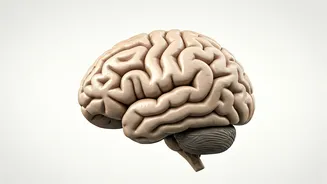Brain Function Struggles
Consistently getting just two hours of sleep each night takes a toll on your brain's ability to function properly. Cognitive functions, like memory and
the capacity to think clearly, become noticeably impaired. The brain needs adequate rest to consolidate memories and make new connections. Without sufficient sleep, this process is disrupted, leading to challenges in recalling information and a general decline in mental sharpness. Decision-making skills also suffer, making it difficult to assess situations and make sound choices. Over time, this chronic lack of sleep can contribute to more serious cognitive issues. It's difficult to maintain focus, leading to reduced productivity and an increased likelihood of making errors in everyday tasks. The ability to solve problems, think critically, and perform complex tasks diminishes significantly when the brain is deprived of the rest it needs. The impact goes beyond feeling tired; it fundamentally affects how your brain operates, making everything from work to social interactions more difficult.
Physical Health Deteriorates
The body's physical health also experiences adverse effects when sleep is consistently limited to only two hours a night. The immune system, which relies on sleep to function correctly, becomes weakened, rendering the body more susceptible to infections and illnesses. Lack of sleep throws off hormonal balance, impacting metabolism and the regulation of blood sugar levels. This increases the risk of developing diabetes and cardiovascular issues. Chronic sleep deprivation elevates blood pressure and increases the chance of strokes and heart attacks. Furthermore, the body's ability to repair itself is hampered, leading to slower recovery times from injury and illness. Muscle recovery, important for physical activity, is impaired. Consistent sleep loss causes inflammation, a factor in many chronic diseases. The combination of these physical stressors makes the body vulnerable, shortening lifespan and significantly decreasing overall health quality. Over time, these combined effects lead to more serious conditions.
Psychological Well-being Suffers
Psychological health is significantly impacted by consistently getting only two hours of sleep. The likelihood of experiencing mood swings, irritability, and anxiety increases substantially. The brain's emotional regulation systems become dysregulated, making it difficult to manage stress and control emotions effectively. Conditions like depression are more likely to develop and worsen. Sleep deprivation can disrupt thought patterns, leading to feelings of hopelessness and despair. This can make it difficult to engage in social activities and lead to social withdrawal. Concentration can become incredibly challenging, affecting the ability to perform daily tasks and participate in work or school. The constant fatigue and mental fog associated with lack of sleep contributes to higher levels of stress and a diminished capacity to enjoy life. The constant stress of sleep deprivation can become overwhelming, severely affecting one's overall mental well-being and sense of happiness.
Long-Term Consequences Unfold
The cumulative effects of chronic sleep deprivation, such as consistently sleeping for two hours a night, lead to serious long-term health consequences. The consistent strain on the body's systems accelerates aging and raises the risk of various chronic diseases. The combination of reduced cognitive function, weakened immunity, and psychological stress can lead to a decline in overall quality of life. The increased likelihood of heart disease, diabetes, and other major health conditions shortens life expectancy. The persistent fatigue and cognitive impairments reduce productivity and affect career advancement. Sleep deprivation also damages relationships and makes it difficult to maintain social connections. Regular, sufficient sleep is crucial for preserving health and well-being. Prioritizing quality sleep is a critical investment in a longer, healthier, and more fulfilling life. The long-term risks highlight the importance of establishing and maintaining good sleep habits.


















